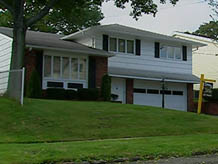A kinder, gentler mortgage lenderMore lenders are reaching out to borrowers in trouble.NEW YORK (CNNMoney.com) -- With foreclosures on the rise, banks are trying a gentler touch. When homeowners default, they cost lenders pots of money, an average of $40,000 or more per home - due to brokerage fees, utility bills and other costs. Banks find they're better off getting borrowers back on the payment track than forcing them out. Mortgage Rates
"The atmosphere is changing," said Lou Tisler, executive director of Neighborhood Housing Services of Greater Cleveland, a non-profit community help group. "A year ago, if you got behind in your mortgage, the attitude was, 'You're going to pay or we'll put you in the street.' Today, lenders are working more with borrowers." Neighborhood Assistance Corporation of America, a non-profit, community advocacy group reported last month that it had received a commitment of $1 billion from Citigroup and Bank of America in loan refinance funds for at-risk borrowers EMC Mortgage Corporation, a subsidiary of Bear Stearns, has created a "loan-modification" team, which it dubbed the "Mod Squad," to reach out to borrowers in trouble. Bettye Banks, who's a vice president with the Consumer Credit Counseling of Greater Dallas, said that a recent one-day counseling session her organization conducted with the Mod Squad drew in nearly 100 troubled borrowers. "It was a phenomenal success," said Banks. "It makes you wonder why it wasn't done years ago." The Mod Squad contacted the borrowers by mail or phone and attempted to set up face to face meetings. According to Banks, 92 borrowers made appointments and all but 17 of these showed up. Another 12 came in cold. Most left satisfied, she said. Forty-four were able to repay their late bills without penalties, putting themselves back on schedule. Most of the others worked out either forbearance agreements, where the lender agrees to suspend payments for a specific time or agreements to bring payments up to date within a specified period of time, usually between 12 and 18 months. Sixteen borrowers were granted loan modifications in which their notes were rewritten and the terms altered. Some went from adjustible loans to fixed loans. Others had the length of the fixed rate loans extended, producing lower monthly payments. The arrears were folded back into the mortgages. Banks said both of the borrowers she helped counsel at the session were good examples of how good-paying borrowers, the ones lenders want most to help - fall into trouble. One, a single mom, had been receiving regular bonuses at work and she had factored them into her budget when she bought her home. But her company suspended the bonuses several months ago and she fell behind in her bills. The second was an older couple. They depended on income from the husband's home-repair business. But when he got sick, that income vanished temporarily. EMC worked out forbearance agreements for both of these borrowers. Only one of the borrowers who attended the session left with a poor outcome; he agreed to a short sale of the property, basically returning the house to the lender for the mortgage amount owed. Banks said that even that borrower, by getting out from under an unaffordable loan, was not dissatisfied with the outcome. "He walked out happy," she said. |
|

